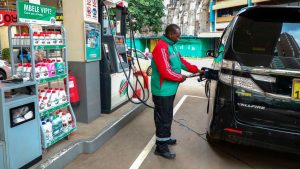The Kenyan government has increased the tax on fuel threefold, with the cost payable to the Energy and Petroleum Regulatory Authority (EPRA) rising from Ksh0.25 to Ksh0.75 per liter.
This levy is one of nine charges on fuel and is raised to support the energy regulator’s operations.

Pump attendant at the Rubis Petroleum Station along Koinange Street in Nairobi County, Kenya serving a client on January 14, 2024. PHOTO | DENNIS ONSONGO | NMG
Apart from this levy, there are eight other taxes and fees on fuel, including excise duty, Road Maintenance Levy, Petroleum Development Levy, Railway Development Levy, Anti-Adulteration Levy, Merchant Shipping Levy, Import Declaration Fee, and Value Added Tax (VAT).
“These regulations shall…come into operation on February 15, 2024,” said Mr Chirchir.
“The Energy Act (Petroleum Regulation Levy) Order, 2018 is revoked.”
“There has been an increase in periodic maintenance cost by about 35 percent attributable to the uptake of roads with failed payments and increase in price construction materials mainly due to rise in fuel prices,” KRB noted in a summary of its 2023/24 annual public roads programme (APRP).
The recent increase in the levy, effective from February 15, 2024, went somewhat unnoticed as the overall fuel price was simultaneously reduced by Ksh1 per liter. The petroleum levy contributes a substantial 80.7 percent to EPRA’s total revenue, amounting to Ksh1.21 billion out of the Ksh1.51 billion in revenues generated by the regulator for the year ending June 2021.
EPRA also earns revenue from the electricity bill and licensing fees, making Ksh236.69 million from the electricity levy during that period. With Kenyans using 4.649 billion liters of fuel in 2023, EPRA collected approximately Ksh1.16 billion from the levy in that year.
